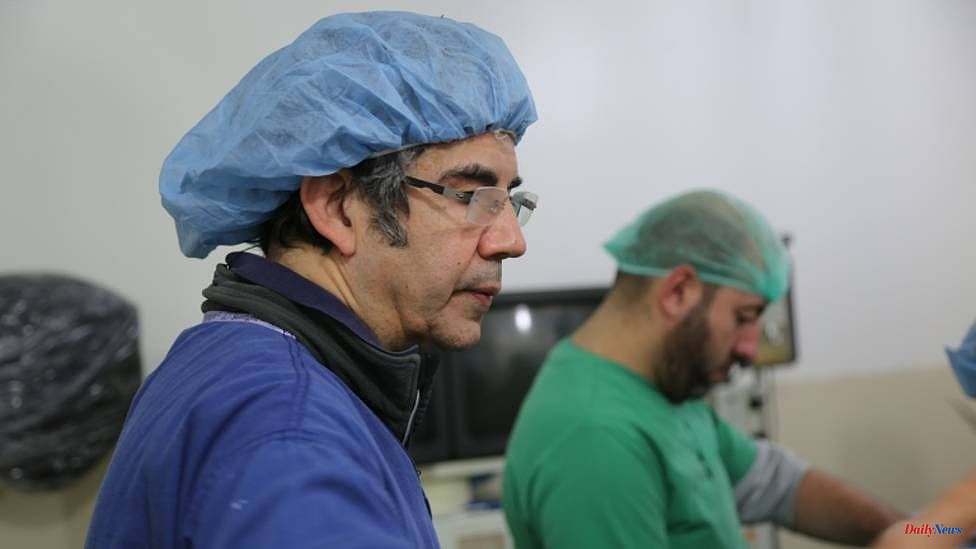David Nott, a trauma surgeon from Ukraine, was in London on Thursday. He was able to help save the leg of a wounded man in war-ravaged Ukraine.
Oleksandr was the actual doctor who performed the complicated operation. He had seen Prof Nott perform the operation in a Ukrainian hospital a week before.
Oleksandr snapped a picture of the wound using his smartphone and sent it off to Prof Nott who had just returned from the UK. The operation was confirmed by a British war surgeon. Oleksandr had also been given a video by the veteran British war surgeon, explaining how it was done.
Oleksandr reports that despite being nervous, the surgery went smoothly thanks to David Nott.
Prof. Nott was born in Carmarthen, west Wales. He has worked previously in conflict zones such as Afghanistan, Iraq, and Syria.
Oleksandr and his patient were fortunate that the consultant surgeon at St Mary's Hospital, London had chosen Ukraine as the next destination for his mission to teach doctors how to treat war injuries.
Russia's bombardment and shelling of cities has caused many blast injuries in Ukraine's hospitals.
Prof. Nott said that it was the most inhumane way to attack the opposition by simply shelling, his first interview since his return from Ukraine. "It causes enormous damage. It can cause terrible, horrible injuries. These include shrapnel injuries to soft tissue, bones, and limbs.
He says that even the shockwave from such a blast can cause severe damage. The "blast wind", which it leaves behind, can cause limb amputations. Traumatic injuries can also result from being thrown against buildings.
The use of Russian thermobaric weapons (also known as vacuum bombs) is particularly concerning in terms of barotrauma, which is an injury that results from changes in pressure during an explosive explosion. They can also cause bleeding in the brain and lungs, which can lead to bloody coughing. They can also burst eardrums and perforate bowels.
He claims he's been to all of Ukraine, "north east, south-south-west, west", but Prof Nott won't talk about specific hospitals or areas that he visited, fearing that Russian forces might target them. The BBC also doesn’t use Oleksandr’s full name nor location.
He used Skype to help with an operation in Aleppo during the war in Syria. However, the hospital was bombed just a few days later. He said that he would never know if they were related.
Professor Nott now claims that Russia has shelled 115 Ukrainian hospitals.
He says, "Blowing up hospitals is a real weapon in war."
Prof. Nott was visiting Ukraine to observe the operations of warzone injuries. He also brought along as many doctors as possible to see him in the operating rooms.
The mission, which was a joint venture between the David Nott Foundation of UOSSM International, didn't end when he left. He would soon be advising Oleksandr remotely, just before the complicated leg operation.
To close the wound and prevent infection from getting into the bone, a flap was taken from the patient's side.
Prof. Nott states that they are "very difficult operations. They are not easy. They go wrong and cause problems."
He says that despite all these difficulties, the end result was miraculous. It worked really well.
Oleksandr, on his part, believes it was crucial to get the advice of someone who has actually been through the operation. "It's a relief when he tells me it will be okay."
He praises Prof Nott for "showing us ordinary doctors how fight on the medical frontline".
Oleksandr states that knowing how to perform these procedures is essential in our case because there are many open fractures and shelling injuries that must be treated.
Through his charity, the David Nott Foundation Prof Nott has translated slides and videos about how to treat war injuries into Ukrainian. "This went on as many doctors' phones as possible," he said.
He hopes that Oleksandr, who he taught, will also pass on the knowledge he learned. Prof Nott states, "He will teach other people how it's done. They'll train others to do the same and hopefully everyone will be able to do this in the not too distant future."
It seems that the demand for these skills will not decrease in Ukraine anytime soon.
The Ukraine's foreign minister stated earlier this month that the battles in eastern Donbas would be reminiscent of World War Two with the use "thousands" of tanks, armoured vehicle, planes, artillery, and planes.
Prof Nott says that the scenes from Mariupol remind him of Aleppo.
He said, "It's exactly like Syria, exactly same tactics."
"Aleppo was totally flattened when I was there in 2016, the entire place was completely and completely destroyed."
Oleksandr said that he now treats "awful injuries" he never expected to see.
He says, "We would love to treat normal trauma," such as grandpas and grandnies who require joint replacements or common fractures.
He added, "We are doing what we have to do every day.












